
Eye health is something we often take for granted until we develop a problem. But by choosing a more proactive path, we have a better chance of enjoying optimal optic health.
Here are four of our other favourite tips for keeping your peepers in tip-top shape:
- Eat for your eyes.
We’re not talking about eating with your eyes, like when you see a particularly scrumptious Instagram photo of a perfectly plated dessert. This tip is all about eating foods that benefit your vision and eye health. Foods rich in nutrients such as omega-3 fatty acids, lutein, zinc, and vitamins C and E may reduce your risk of age-related vision conditions such as macular degeneration and cataracts. Fill up on leafy green veggies, oily fish like salmon, non-meat protein like eggs, nuts and beans, and yummy citrus fruits to see your way to stronger, healthier eyes.
2. Don’t forget your shades.
Sunglasses not only make you look cool, they help protect your eyes from the sun’s harmful UV rays. Look for lenses that block out 99-100% of both UVA and UVB rays for the best protection and choose a wraparound style for added coverage. Sunny days aren’t the only time to cover up your eyes; remember to wear safety glasses or goggles to prevent injury when playing certain sports or doing home repairs.
3. Step away from the screen.
From computers to televisions to smartphones, screen time has become omnipresent in our daily lives. All of this screen staring can lead to eyestrain, blurred vision, dry eyes, difficulty focusing at a distance, and headaches. To reduce these negative effects, try looking away every 20 minutes or so for at least 20 seconds and taking a 15-minute break every two hours. If you wear glasses or contact lenses, make sure your prescription is current. Try positioning your computer screen so your eyes are level with the top of your monitor and you are looking down slightly. If all else fails, consider putting your phone, laptop and tablet away and just experience life firsthand for a while!
4. See the eye doc.
Don’t wait until you encounter an actual problem, regular visits to the eye doctor can help maintain and protect your vision. An annual eye exam with an optometrist may include standard vision tests for nearsightedness, farsightedness, astigmatism, or presbyopia as well as eye pressure and optic nerve tests for glaucoma. For more specialized coverage, an ophthalmologist can treat eye diseases and perform surgeries of the eye in addition to providing general eye care.


